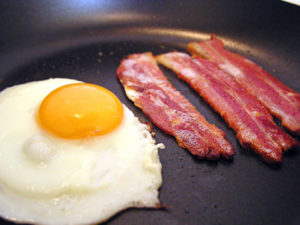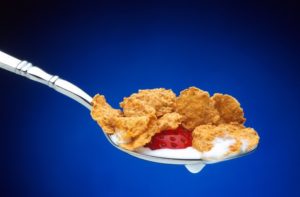A Calorie isn’t just a Calorie
In my last post I explained that insulin is the key to weight gain and weight loss. I also explained that one way insulin is controlled through dietary sugars. So, if you primarily eat foods that convert to sugar in the body, you will spike insulin and cause your body to store fat. On the other hand, if you eat primarily fat and moderate amounts of protein with non-starchy vegetables you will keep insulin low and stay in fat-burning mode.
Low-fat, high-carb sends a different signal to the body than high-fat, low-carb. Food is a messenger, the body is listening to what you are telling it. Based on the information you are sending in, the body will respond with what it believes is an appropriate hormonal response.
The question is, do calories really matter if you’re sending the body the proper message, keep insulin low and burn fat. Is the type of food you eat more important that the actual amount of calories you consume? I think the answer is yes. The type of food you choose to eat will have a greater impact on your overall body weight and health than the number of calories you choose to eat or not eat.
Quality Calories vs. Quantity Calories
First, if you eat mostly high quality calories as fat and protein in the form of real, whole foods, you will feel full and eat less. I speak from experience. Whenever I focus on fat, moderate protein and low-carb in the form of non-starchy vegetables my appetite really subsides. I actually have to make sure to eat so I get enough calories – I don’t like to go below 1500 calories. Somewhere between 1500 – 2000 in a day is a good range for me. I also like quantity. It makes me sad if my plate isn’t full. Check out my post Food for Thought to see what 200 calories looks like when it’s real food vs. “fake” food. Hint, you get a lot more (quantity) when you eat real food.
 What does that mean in real life? It’s good news, a breakfast of bacon and eggs with a side of sautéed spinach and a half an avocado is full of high quality calories and is better for your health and weight loss than dry toast, a yogurt, a cup of fruit juice and some coffee. The eggs and bacon even sound better. You get to eat more AND promote healthy balance in your body.
What does that mean in real life? It’s good news, a breakfast of bacon and eggs with a side of sautéed spinach and a half an avocado is full of high quality calories and is better for your health and weight loss than dry toast, a yogurt, a cup of fruit juice and some coffee. The eggs and bacon even sound better. You get to eat more AND promote healthy balance in your body.
Second, to drive this point home, there is a guy named Sam Feltham and he did a self experiment where he ate close to 6000 calories/day for 21 days. Sam ate a high-fat, low-carb, real food diet and didn’t gain any significant weight in fact his waist measurement decreased!
- Start weight was 188.7 lbs / End weight 191.5 lbs. – total weight gain of 3 lbs. eating around 5700 for 21 days.
- Start waist circumference 31.2 inches / End waist 30.1 – total loss of 1 inch
This guy ate 5700 calories for 21 days and got leaner. I will put the link to his n=1 experiment blog post at the bottom. You have to go look at the pictures.
O.k., so now you’re thinking well this is one of those guys that can clearly eat anything and not gain weight. I think that’s what a lot of people were thinking so he did another n=1 experiment and this time he ate a low-fat, high-carb diet. Guess what, it didn’t go as well. He’s a young healthy guy so it actually didn’t go as badly as it might have for someone else but all and all it was very different from the high-fat, low-carb experiment.
This experiment was the same as the original, 21 days with close to 6000 calories/day. The only difference was the type of calories.
- Start weight 197.8 lbs / End weight 213.4 lbs. – total gain 15.6 lbs.
- Start waist size 31.3 inches / End waist size 35 inches – total gain 4 inches
O.k., I take it back, that’s pretty bad. 15 lbs. and 4 inches in 21 days, that’s a LOT!
First of all, 6000 calories in a day is a ton. The fact that he didn’t see any significant weight gain on the high-fat, low-carb diet is amazing but not surprising when you think about how food interacts with the body and what kind of hormonal messaging it brings with it.
Let’s Compare
Here’s his macronutrient breakdown for each experiment:
High-fat, low-carb – 5700 calories
- 10% carbs – 570 calories as carbs – 142.5 grams
- 53% fat – 3021 calories as fat – 336 grams
- 37% protein – 2109 calories as protein – 527 grams
Low-fat, high-carb – 5700 calories
- 64% carbs – 3648 calories as carbs – 912 grams
- 22% fat – 1254 calories as fat – 139 grams
- 14% protein – 798 calories as protein – 199 grams
Let’s look at these number based on 2000 calories, a more typical amount
High-fat, low-carb – 2000 calories
- 10% carbs – 200 calories as carbs – 50 grams
- 53% fat – 1060 calories as fat – 118 grams
- 37% protein – 740 calories as protein – 185 grams
Based on a 2000 calorie diet it’s easier to see that this breakdown is low-carb and some what high fat but I’d actually call that more moderate for fat and I would call the protein high. If I was in charge of the breakdown I’d increase the fat and drop the protein a bit but that’s just me.
Low-fat, high-carb – 2000 calories
- 64% carbs – 1280 calories as carbs – 320 grams
- 22% fat – 440 calories as fat – 49 grams
- 14% protein – 280 calories as protein – 70 grams
This looks more like the standard American diet (S.A.D).
This looks more like the standard American diet (S.A.D).
The quality of food between the two experiments is a factor too. When eating high-fat, low-carb he focused on natural foods and for the low-carb, high-fat diet he ate a more standard American diet with lots of processed “fake” foods.
 Do yourself a favor, skip the sugary breakfast options like cereal (and yes that includes granola), pancakes, potatoes, yogurt, fruit smoothies, muffins, waffles, fruit juice etc.. and opt for proteins with non-starchy vegetables and healthy, nourishing fat. It will be delicious, satisfying, and help you maintain a nice constant level of energy. For real!
Do yourself a favor, skip the sugary breakfast options like cereal (and yes that includes granola), pancakes, potatoes, yogurt, fruit smoothies, muffins, waffles, fruit juice etc.. and opt for proteins with non-starchy vegetables and healthy, nourishing fat. It will be delicious, satisfying, and help you maintain a nice constant level of energy. For real!
When I talk about food and insulin I always say diet is one way insulin is controlled. That’s because there’s another factor when it comes to insulin secretion and that’s stress. Yup, the hormone cortisol is the other piece of the insulin puzzle. In my next post I will explain what stress (cortisol) does to the body and how it can be a very important part of your weight loss recipe.
Remember, eat well, feel good, have fun!
Part 1 – Weight Gain, is it Calories or is it Hormones
Part 2 – Body Weight Set Point
part 3 – Insulin, your key to weight loss
Part 4 – The Problem with High Fasting Insulin
Part 5 – Macronutrients and Weight Loss
Part 6 – Not Enough Fat, Too Many Carbs

I’m Amy a board certified holistic nutritionist, certified functional nutritionist and lifestyle practitioner and certified Life Coach. I help women in midlife understand the changing needs of their body so that they can stop dieting and lose weight permanently. At 56 I live what I teach. Don’t believe the story that your best years are behind you. They are not. Your best years are just starting!
